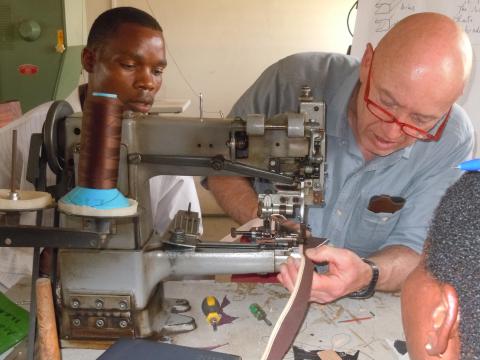UNIDO has been dealing with specific problems of the leather industry more than four decades since its early years. The projects have focused on improving capabilities and performance in the collection of hides and skins, in leather processing (tanning), and in the manufacture of footwear and other leather products (such as leather goods, gloves, leather garment, upholstery and sports goods). Most successful programs in the leather sector: Environmental protection and pollution control including industrial safety directly related to leather processing and leather products manufacturing through the: ▪ Waste minimization and conversion of solid wastes into saleable by-products. ▪ Design, construction, and operation of tannery Effluent Treatment Plants (ETPs) with particular emphasis on common, low cost systems for SME clusters (CETPs). ▪ Handling and safe disposal of solid wastes and sludge. Direct assistance to industrial units and developing human resources by: ▪ elaborating and implementing comprehensive professional training systems; ▪ establishing and/or rehabilitating national, (sub)regional and international training-cum-service institutions; ▪ implementing experts meetings, workshops, seminars and special training courses in design, technology and management related areas; ▪ initiating, organizing and monitoring cooperation among training, service and Research & Development centres operating in developing and industrialized countries; ▪ benchmarking and evaluating business opportunities, finding or establishing markets (niches), building product ranges, improving production methods and product quality, enhancing productivity, and developing labour and managerial skills. Global forums – UNIDO Leather and Leather Products Industry Panel and publications: ▪ The main objective of the Leather Panel is to elaborate topics and to produce discussion papers for the consultations, but also as tools for the project implementation (e.g. training material, various publications etc.); ▪ Leather Panel members is an unique mixture of 16-22 reputed specialists in leather processing (tanning), footwear and other leather products manufacturing, equipment suppliers, distribution (trading), related pollution control, quality testing and training institutions working in private companies, Government agencies and trade associations, various types of institutions, trade press; ▪ Several documents produced for and discussed in panel meetings are now used as reference materials worldwide (e.g recent Carbon Footprint study for the leather industry presented during the 18th LPM); ▪ The panel is also very useful for preparation of project proposals/ideas and establishing contacts between UNIDO and relevant leather organizations; ▪ Global forums, e.g. Leather Panel, publications, Expert Groups Meetings provides UNIDO much needed visibility. The Main strengths, advantages and features of the UNIDO Leather operations are: □ technical orientation in formulation and execution/implementation of assistance programmes addressing problems on the "shop-floor level" and offering practical solutions in product development, technology, production control and marketing; □ integrated programme approach on the global, sub/regional and national level in addressing the actual needs of developing countries in technical assistance, i.e. providing services dealing not only with the mainstream of the technology, but also giving sufficient attention to the sectoral strategies, (physical and human) infrastructure, support industries, environment protection (including legislation), marketing and management; □ output orientation providing visible and measurable results in the assisted production units and institutions; □ direct involvement of staff members in projects by performing specific expert's jobs as well as authors/lecturers in international scientific meetings, congresses etc; □ pilot solutions that bring about the much needed multiplication effect and that are applicable beyond the direct recipients' plants; □ extensive training of recipients of TA in different forms: on-the-job, national/regional, workshops, panel discussions; □ practical technical papers, manuals, guides, and studies on specific issues in the sector.


